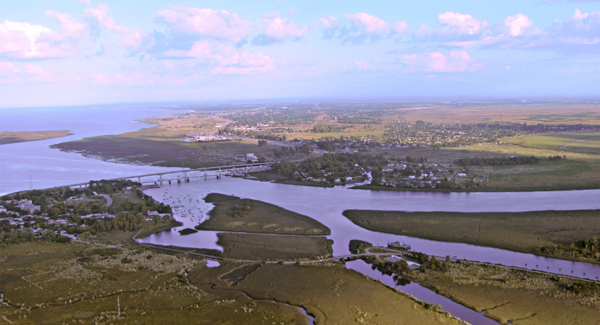SARAS advances in the implementation of the GobHidro Project in the Santa Lucía river basin (Uruguay)

Since July 2020, the SARAS Institute has been developing the GobHidro Project, a research project on hydrosocial territories and water governance in the Santa Lucía river basin (Uruguay), funded by the National Agency for Research and Innovation (ANII). The project seeks to contribute to the production of interdisciplinary knowledge for better management and governance of water and the existing problems in the river basin.
The Santa Lucía river basin is of strategic importance, since it provides drinking water for the metropolitan region of Montevideo, supplying approximately 60% of the Uruguayan population. This watershed faces problems related to water quality, but it also faces difficulties related to water governance and conflicts between different uses of water and land. In 2013, when there were events of tap water with odour and taste affecting citizens in the metropolitan region, the State (through the National Environmental Directorate) proposed the Action Plan for the Protection of Water in the Santa Lucía Basin, an instrument that promotes measures to reverse the contamination process. In 2019, second-generation measures of this plan were presented based on the review of the first measures. On the other hand, the National Water Directorate is finalizing the development of a Basin Plan with guidelines for the integrated management of water resources (governed by the National Water Plan), in coordination with the Basin Commission, a participatory advisory board formed in 2013, which brings together government actors, users, and civil society.
In this context, the GobHidro project’s general objective is to investigate water management and governance in the Santa Lucía river basin, with a focus on the development and implementation of these two management instruments, the Basin Plan, and the Action Plan. The project received the support of the María Viñas Fund of the National Agency for Research and Innovation of Uruguay (FMV-ANII, 2020-2022). It also has two additional scholarships: a postdoctoral scholarship financed by the Graduate Academic Commission of the University of the Republic (CAP-UDELAR) and a master’s scholarship provided by ANII. The research team is composed of members of the SARAS Institute (which leads the project), Faculty of Social Sciences (FCS-UDELAR), Faculty of Sciences (Fcien-UDELAR), Eastern Regional University Centre (CURE-UDELAR), Institute of Energy and Environment at the University of São Paulo (IEE-USP), and the School of Public Administration of the Florida Atlantic University (EPA-FAU).
During the first semester of the project in 2020, some team meetings were held (mainly by virtual means), to discuss the theoretical and conceptual framework of the project, as well as the variables or dimensions that would be analyzed (both from interviews and documents of the Santa Lucía basin and the basin commission, among others). The project is based on two theoretical-conceptual approaches related to the fields of the political ecology of water and social-ecological systems: adaptive and polycentric governance (characterized by multilevel coordination between actors, various decision-making spheres, diverse and inclusive participation, institutional flexibility, and management of uncertainty, etc.) and hydrosocial territories (understanding these as spatial configurations of people, institutions, water flows, hydraulic technology, and environment about the control of water). In 2020, in addition to making progress in the review of documents, a systematic review of literature, and mapping of actors, it was possible to start (despite the context of COVID-19) conducting interviews with actors from the river basin and participate in Rural Development Committees, during which the project was presented, and dialogue was held with the institutional and agricultural stakeholders. In the interviews, different topics are addressed, including the opinion of the different actors on the problems of the basin and possible solutions, the management and governance of water, the functioning of the basin commission, the Action Plan and the River Basin Plan, and the coordination and links between actors.
In 2021, interviews with actors involved with the basin (for example, from the government sector, production, social organizations) will continue to be conducted, as well as participant observation in different spaces, such as the Rural Development Committees and the Basin Commission. After analyzing the data collected throughout the year, a workshop will be organized with actors of the basin, to discuss the preliminary results of the project and their implications for improving water management and governance.
We hope this project will provide contributions for a better understanding of the existing conflicts in the Santa Lucía river basin, as well as for strengthening adaptive water governance and improving water quality (in the medium to long term). The project will allow the production of original interdisciplinary knowledge about the Santa Lucía river basin in Uruguay, based on the above theoretical frameworks.
